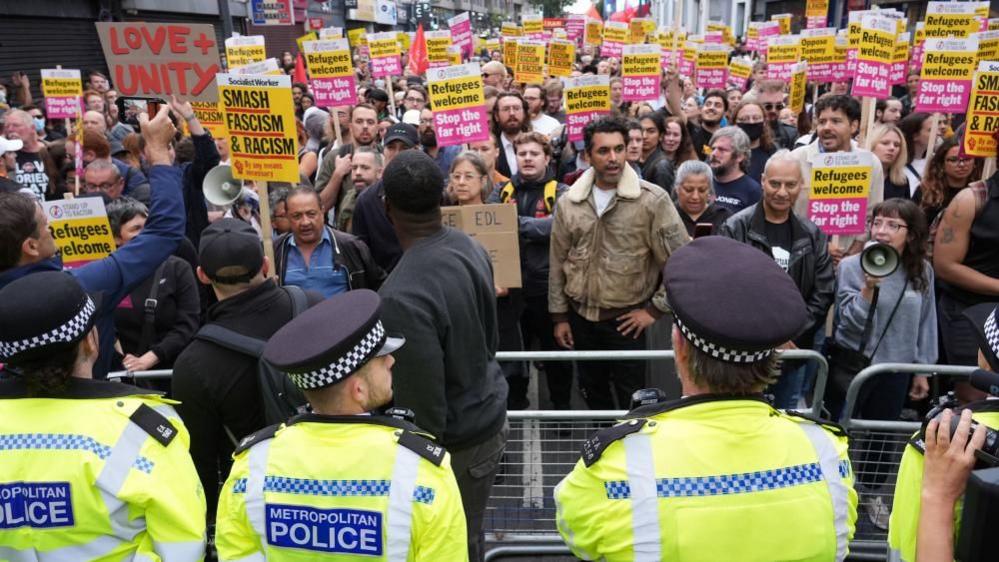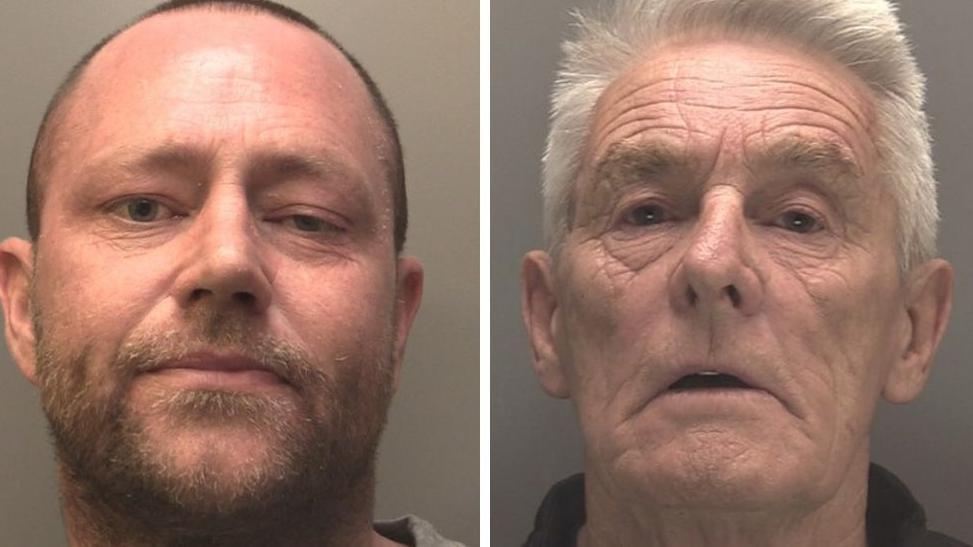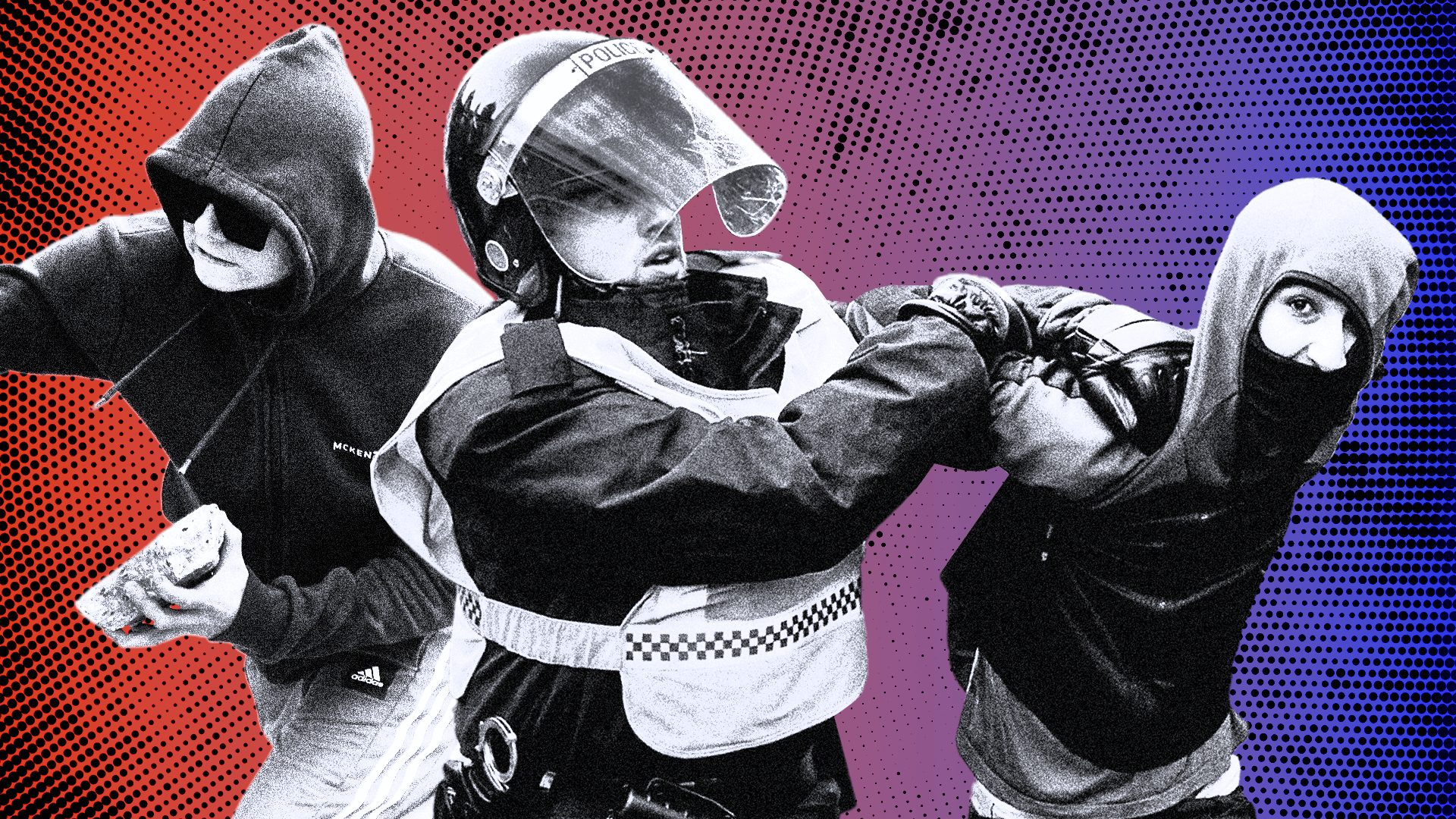How the tide turned after a week of riots

- Published
Six thousand riot-trained police officers were on standby to respond to potential disorder wherever it happened on Wednesday night.
But while thousands of anti-racism campaigners turned out, the far-right was largely absent.
That was a key moment when the tide turned in this wave of public disorder, says Chief Constable Gavin Stephens, one of the UK’s most senior police officers.
But he stressed there was no room for complacency, with the police now “very focused on the weekend" with “many potential events still being advertised and circulated online”.
He added: “Yes it was a turning point. Is it a decisive and definitive one?
"We will see over the coming days, but it was clearly a shift in behaviour.”
Communities had been braced for a night of unrest after it emerged a list purporting to contain the names and addresses of immigration lawyers was being spread online.
But this largely failed to materialise. Forces were aware of 160 sites of potential public disorder, but only 36 of those needed a significant policing presence.
Why? It appears the huge number of riot officers on standby, combined with the stiff sentences of up to three years in prison already handed out by the courts, had been an effective deterrent.
In practical terms, potential rioters seem to have been put off by the sheer number of police officers deployed.
Looking back to Southport nine days ago, 500 or so rioters clearly outnumbered the Merseyside officers deployed to protect the local mosque.
But it is unlikely that protesters could have got more than the 6,000 officers out on to the streets across the UK on a Wednesday night to match police numbers.
Police say some known far-right agitators appeared on the fringes of events, lurking and observing activity, but then just melted away.
Anti-racism protesters rally after week of riots
- Published8 August 2024
Who are the rioters and what jail sentences have they received?
- Published23 August 2024
What’s more, some of the large anti-racism demonstrations last night in places like Walthamstow in north-east London and Newcastle would have made it impossible for anti-immigration protesters to get anywhere near their suggested target.
In Walthamstow, riot officers began the evening trying to protect an immigration lawyer's office, but once thousands of anti-racism campaigners had turned up, the officers withdrew, and merely threw a protective cordon around the outside of the demonstration.
Chief Constable Stephens, who is chair of the National Police Chief’s Council, said he also believed community peer pressure had become an important factor.
"Up and down the country there have been thousands of conversations going on in families and peer groups saying 'Is it worth it?' And of course, it isn’t worth it.
"Young people's lives have been irrevocably changed."
There is a sense that nobody wants to claim victory too soon on this complex and fast moving situation.
Those 6,000 specially trained officers are still available to deal with future incidents, with officers being sent to different regions around the country as needed.
New video shows Liverpool library riot and police-worn footage as officers were attacked
When I asked Home Secretary Yvette Cooper if she believed Wednesday night marked an end to the violence she told me the government was “not going to take its foot off the pedal on this”.
“The police and the criminal justice system all have our strong support to keep going and keep making sure criminals pay the price for the kind of violent disorder, the thuggery, the extremism and the intimidation we have seen in communities. We will not stand for this violence,” she said.
“We are going to continue with this strong policing response, making sure there are additional police officers ready to respond, and also making sure we continue with prosecutions and with taking cases rapidly to court and getting sentences.”
Bringing those cases to court so quickly has taken an enormous effort by investigators.
They have pored over body-worn video and CCTV, and made use of facial recognition technology to match people in riot footage against known offenders.
Faced with overwhelming evidence, many of the rioters have pleaded guilty in order to reduce their sentences by a third.
For example, at Liverpool Crown Court, had Derek Drummond not pleaded guilty to punching a police officer, his three-year sentence is likely to have been four-and-a-half years.
And there are many others due to appear in court over the coming days in relation to this extraordinary week of violent disorder.
Related topics
- Published8 August 2024

- Published9 August 2024
